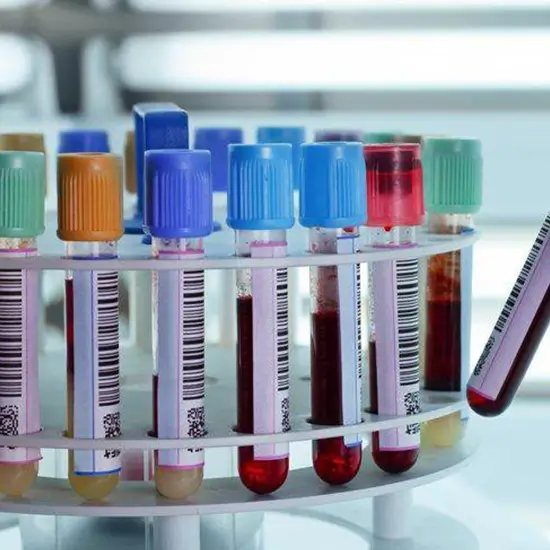
Book Clot Retraction Appointment Online Near me at the best price in Delhi/NCR from Ganesh Diagnostic. NABL & NABH Accredited Diagnostic centre and Pathology lab in Delhi offering a wide range of Radiology & Pathology tests. Get Free Ambulance & Free Home Sample collection. 24X7 Hour Open. Call Now at 011-47-444-444 to Book your Clot Retraction at 50% Discount.
When the size of the blood clot starts dropping off over several days, the condition is called clot retraction.
The Clot Retraction Test is a blood test that is used to find out the total time required for the formation of a blood clot in a glass test tube. In simple words, you can say that a clot retraction test is the ability of the blood to draw in from the sides of a glass test tube.
The coagulation screen is an assortment of screening scheduled to deliver a rapid non-specific estimation of hemostatic problems.
The various screening tests are-
When any injury takes place, it causes bleeding, and many proteins work together to clot the site. These proteins are known as coagulation factors or clotting factors.
Bleeding disorders are disorders that affect the way the body controls blood clotting. Bleeding problems can also be associated with the abnormality of clotting factors.
A PTT test aids in checking a specific group of clotting factors. The PTT test is done with other tests that check clotting factors and their working.
A PTT test is used to detect the problems related to a specific group of blood clotting factors. The test is done to
No special instructions you need to follow for the test. But don’t forget to inform the doctor about your complete detail of medicines or supplements.
An average value for a PTT is 60 to 70 seconds. If the Clot formation is too quickly, it is abnormal. This condition may lead to clots that block your blood flow and may lead to severe problems.
In a healthy person, when an injury occurs, various blood proteins work together to form a clot. If there is any abnormality in clotting factors, it may lead to bleeding disorders. The APTT test is also used to measure the time your blood takes to clot.
This Test helps to evaluate your body’s ability to form clots. If a patient has any bleeding disorders, detect or rule or rule out bleeding problems.
It is advised when the patient bleeds excessively and has to undergo any medical or dental procedure.
The bleeding time test determines how fast your blood clots to halt bleeding after an injury. The test also pertains to making small punctures in your skin.
This test measures the levels of a blood protein known as fibrinogen. Fibrinogen is made in the liver and aids in blood clot formation.
Low fibrinogen causes your body to feel difficulty in your blood to clot.
This test is advised to detect the level and function of fibrinogen.
It is often advised when you have excessive bleeding or recurrent miscarriages.
The thrombin time(TT) test analyzes possible bleeding disorders or inappropriate blood clot formation.
This test is recommended alone, along with some other tests, when a person is encountering excessive bleeding or clotting and ventures into continuous miscarriages.
A prolonged thrombin time may indicate:
Blood sample.
Error-free findings help your doctor in interpreting the results effectively. For error-free findings of your test, book your clot retraction test with Ganesh Diagnostic and Imaging Centre (GDIC).
| Test Type | Clot Retraction |
| Includes | Clot Retraction Test (Hematology) |
| Preparation | |
| Reporting | Within 24 hours* |
| Test Price |
₹ 200
|

Early check ups are always better than delayed ones. Safety, precaution & care is depicted from the several health checkups. Here, we present simple & comprehensive health packages for any kind of testing to ensure the early prescribed treatment to safeguard your health.